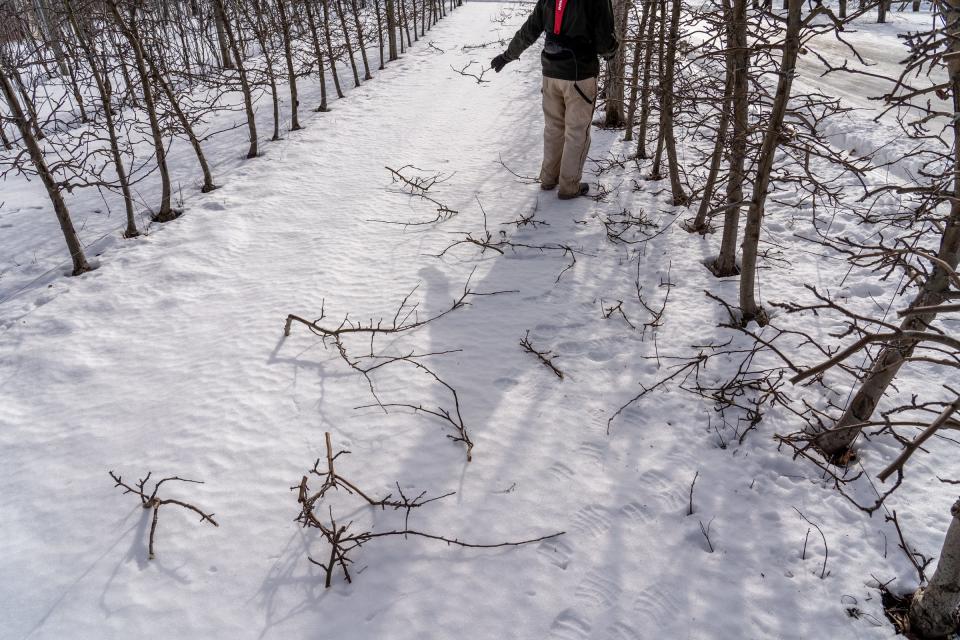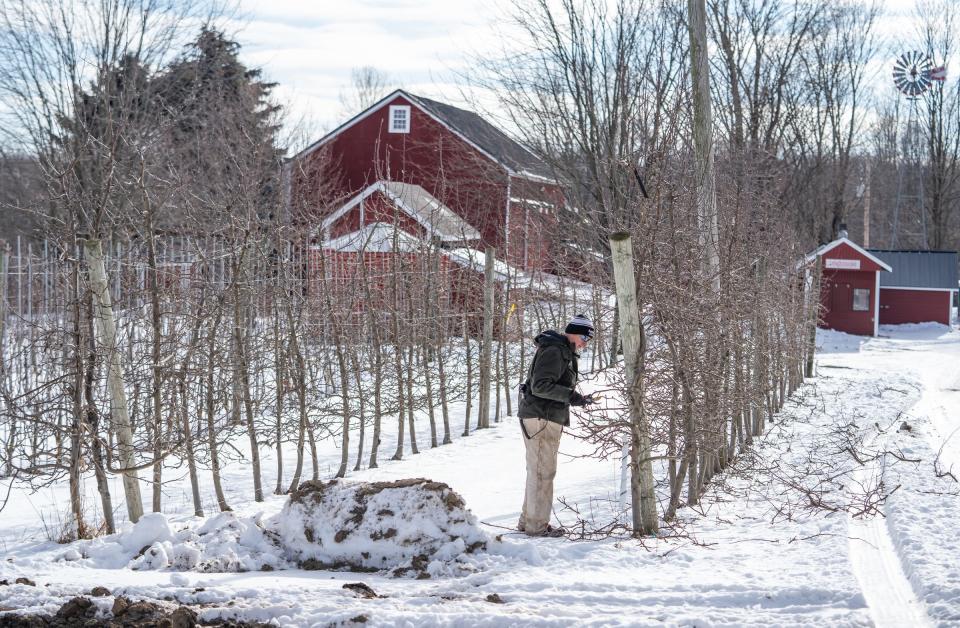Climate change is already hurting Michigan's cherry, apple crops — and it could get worse
Juliette King McAvoy's family built a fruit empire in what might seem an unlikely place.
McAvoy's father and mother, John and Betsy King, founded King Orchards in 1980 with John's brother, James, and his wife, Rose. They farm about 250 acres of cherries, apples and other fruits and vegetables around Torch Lake in Antrim County.
Northwest lower Michigan, with its frigid, snowy winters, doesn't sound like a place where cherries and apples would thrive. But Michigan grows 70% of America's tart cherries, and is the third-largest apple producer in the U.S., mostly along the state's western shore.
Making it possible is the enormous weather moderator just to the west of King Orchards: Lake Michigan. The lake creates a microclimate for the areas just to its east — the prevailing westerly winds passing over the cold waters of the lake as winter turns to spring keep fruit trees dormant a little longer, protecting them from crop-killing frosts. Similarly, the warmer lake protects nearby fruit from frosts in autumn.
But that delicate, natural dance, relied upon by Michigan's earliest tribal residents going back thousands of years, is now being disrupted by human-influenced climate change. And its effects are already being felt in Michigan's economically vital "fruit belt."
"My dad remembers one major crop failure in his young life, in the 1960s or so," said McAvoy, a vice president at King Orchards. "But in the last 20 years, we've had a crop failure in 2002, 2012, 2020 and 2021."
Lake Michigan is warming, year by year, decade by decade. A study last year by the National Oceanic and Atmospheric Administration's Great Lakes Research Laboratory in Ann Arbor examined data collected every hour over the last 30 years by technology deep within the waters of Lake Michigan. The study found that even 500 feet below the surface, the water is warming by about 0.11 degrees Fahrenheit each decade, faster than the ocean or even air temperature.

Though Great Lakes ice cover can vary dramatically winter to winter, the long-term trend shows warmer, more open water over winter. This winter is expected to be the 17th — out of the past 25 — that experienced overall Great Lakes ice cover below the long-term average.
Paradoxically, a warming Lake Michigan is making the state's fruit belt more at risk of killing frosts. Warm winters rouse the fruit trees out of their dormancy too early, and they begin to blossom. If a typical spring cold night or frost follows, it ruins the blossom for the season, and the tree won't bear fruit.
Michigan lost 90% of its tart cherry crop in 2012 from just such an event.
"We had a mild winter, then we had really random warmups, getting up to 70 degrees in March," said Nikki Rothwell, a Michigan State University Extension specialist and coordinator of the Northwest Michigan Horticultural Research Center. The Traverse City-based, fruit industry-supported research site studies best practices for growing and producing crops.
"Sweet cherries typically bloom around May 10. We had a full bloom on sweet cherries on my mom's birthday, March 29," Rothwell said. "After that bloom, we had 22 freeze events."
That season yielded almost no sweet or tart cherries, no juice grapes and apples from only one pocket of farms, she said.
Warmer winter, worse crop
A new scientific study confirms what's going on isn't an aberration, but rather a trend. Researchers at the State University of New York-Buffalo State College looked at agricultural data on fruit production in Michigan by year, and compared it with climate data, going back to the 1970s. It found a clear connection between warmer temperatures and reduced fruit crops — and Lake Michigan warming was more important than even air temperatures.
"Counterintuitively, the warmer the winter; the worse the crop," said Robert James Warren II, an associate professor of biology and co-author of the study, published earlier this month in the peer-reviewed International Journal of Biometeorology.
Lake Michigan takes tremendous amounts of energy to warm in the spring, so it keeps everything dormant until that volatile spring period is over, Warren said. And for fruit trees, when that warm period starts, it can't stop.
"They can't put out two buds a year," he said. "So if they bud, and it's still a volatile spring and it freezes, they are done."
This isn't just a concern for fruit farmers or produce shoppers. The direct economic impact of fruit production in Michigan is more than $485 million annually, with total economic activity, including industries related to fruit production, at $753 million, according to a 2018 Michigan State University study.
"All of those apples at McDonald's, those apple slices in Happy Meals? Those are coming from Michigan growers, processed within Michigan," Rothwell said.
Michigan produced 65.6 million pounds of tart cherries last year, the second straight year of production below 70 million pounds, compared with more than 200 million pounds of cherries in 2018. Killing spring frosts were the culprit both seasons.
It was a similar story with apples. Michigan produced 760 million pounds of apples last year, down from the 1.275 billion pounds it produced in 2016.
Philip Schwallier, 69, farms 100 acres of apples on his farm in Sparta, about 10 miles north of Grand Rapids. Born and raised on a fruit farm, he is the fourth generation of his family to grow fruit in Michigan.
Schwallier lost about 40% of his crop last spring after an early May frost. He said he'd purchased a less-expensive — but less-protective — crop insurance, which meant less compensation for his major crop losses.
"All of us fruit growers are gamblers; we take a big chance on our crop," he said. "This time, I got dinged."

More:Michigan's climate: Models project 30% increase in rain, snow
There was a time when a bad crop year balanced itself out — scarcer produce meant higher prices, so farmers earned similar income. But with increasing competition, if demand for Michigan apples can't be met, purchasers can turn to states like Washington, Pennsylvania and New York, states that didn't face the frost impacts last season that Michigan did, Schwallier said.
Hard to survive the volatility
Crop insurance is also based, in part, on an average of recent years of production, McAvoy said. "If every fourth year you have a crop failure, your basis is going to continue to drop, that amount that's insured," she said.
"In 20 years, we've had four crop failures, and increasing frequency. There aren't many business plans that can survive with that kind of volatility."
Schwallier has employed technology to combat spring frosts on his apple farm — wind-mover turbines that push warmer air down toward the colder ground, perhaps buying a vital few degrees of warmth; and micro-sprinklers supplying trees with relatively warmer underground well water. But the measures are limited in effectiveness, and expensive, he said.

At King Orchards, the family is attempting to survive through diversification. The farm now also grows asparagus, strawberries, apricots, peaches, pears, plums and a variety of vegetables, McAvoy said.
"Because of the changing climate, we have continued to add crops that are less vulnerable," she said.
Scientists project surface temperatures on Lake Michigan could rise up to 9 degrees by 2100 if greenhouse gas emissions are not dramatically reduced.
The warmer temperatures bring other potential harms to fruit trees: diseases, fungal pathogens and invasive insects such as spotted-wing drosophila that attack soft-skinned fruits like cherries are all likely to proliferate, Rothwell said.
The time and expense involved in fruit farming — a planted cherry tree takes seven years to produce its first crop, and a farmer relies on that tree to produce fruit for about 25 years — is causing generational farmers to take hard looks at the future.
"As the climate changes, it may not be a slam-dunk to plant cherries where Grandpa always did," Rothwell said.
King Orchards isn't removing any of its healthy orchards, but it has put the brakes on replanting, McAvoy said.
"We're very concerned about the future of the cherry industry and our ability to grow cherries in northern Michigan," she said. "When I think about my investment, what is the climate going to look like in 20 years? Is my investment going to pay out?"
Cherries aren't just an economic driver for the region, they are a part of its identity. Rolling hills of orchards have been every resident's vista for generations. Visitors arrive at Cherry Capital Airport in Traverse City, the home of the annual National Cherry Festival that draws more than a half-million visitors every summer.
"If we value fresh produce that's grown locally, we need to be concerned," McAvoy said. "Here at King Orchards, we are on the northern cusp of the growing region. Growing very vulnerable fruit to crop damage like these tart cherries, we feel like the canary in the mine. This might be just the start of what's a very concerning change to our biodiversity and agriculture in general."
Contact Keith Matheny: 313-222-5021 or kmatheny@freepress.com.
This article originally appeared on Detroit Free Press: Climate change already harming Michigan's vital cherry, apple crops

